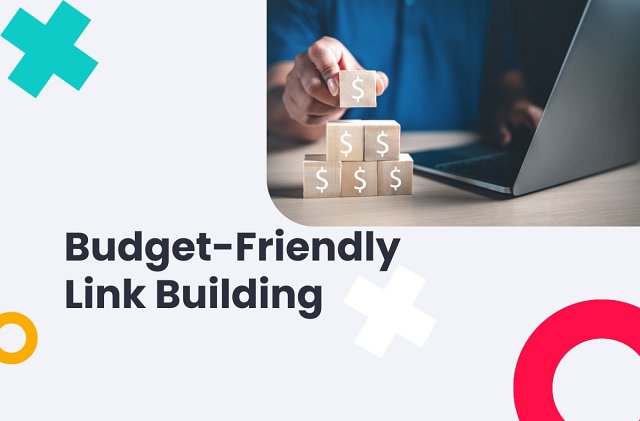(16 min. read)

Understanding the Value of Backlinks in SEO
Before getting into cost-effective link building techniques, let’s consider what makes backlinks valuable in the first place. In the eyes of search engines like Google, backlinks signal that your content is valuable and trustworthy, especially if they come from highly authoritative sources. When reputable sites link to your page, it sends a strong message to search algorithms that your content is worth showing to their users more than other matching pages.
Backlinks are one of the most important SEO ranking factors. Google’s algorithm specifically weighs backlinks heavily when determining whether a website should appear in search results and how highly. The more high-quality backlinks you have, the more likely you are to rank for competitive keywords, because Google interprets backlinks as third-party endorsements, essentially vouching for the reliability and usefulness of your context (unless they are nofollow links).
The Challenges of Budget Link Building
While link building is a vital part of SEO, it’s often seen as one of the most challenging and expensive aspects of digital marketing. For many businesses, especially small or growing ones, allocating a large budget to SEO and link-building efforts can feel out of reach. High-authority backlinks don’t come easily or cheaply, and the time and resources needed to build an effective backlink profile can quickly add up. Is it possible to build quality backlinks on a limited budget, then?
The answer is yes, but it’s important to understand the obstacles that make budget-friendly link building difficult.
What Makes Link Building Potentially Expensive?
Many factors, such as the time-consuming nature of outreach, the cost of creating link-worthy content, and the challenges of acquiring links from high-authority sites, contribute to the perception that effective link building is expensive. While the concept of getting backlinks seems straightforward—other websites linking to your content—the reality is much more complex. There are significant costs associated with time, resources, and sometimes money when it comes to building a sustainable, high-quality backlink profile.
One of the primary reasons link building is considered expensive is the sheer amount of time it requires. Securing backlinks is not a process that happens overnight. It involves extensive research, outreach, and relationship-building. Researching potential sites, personalized outreach, and follow-up all take time and effort. Then comes content creation, which requires content types specifically designed to attract backlinks, along with costs associated (hiring writers, design and development costs, media promotion, etc.).
Securing high-authority backlink opportunities is also notoriously difficult. These sites receive pitches from countless websites daily, and standing out from the crowd with a compelling value proposition is the only way to get their attention. While third-party link-building services can be an option, avoid directly purchasing links, as this violates Google’s guidelines and can lead to severe penalties, including complete removal from search results.
Common Misconceptions About Affordable Link Building
Many businesses immediately assume that only expensive link-building services can deliver results, leading them to shy away from pursuing cost-effective strategies that bring long-term benefits. It’s important to remember that budget-friendly link building doesn’t have to mean low-quality.
One of the biggest misconceptions is that inexpensive links are inherently low-quality and harmful to your SEO. This belief stems from an overgeneralization based on unethical practices like purchasing links from link farms or low-quality directories, which indeed offer poor value and can hurt your rankings.
However, cost-effectiveness doesn’t have to mean cutting corners. Many niche blogs, even with strong domain authority, accept guest posts without charging a fee. Networking with industry peers and engaging with bloggers, offering value to other businesses through collaborations, can also help you naturally earn backlinks over time. Creating high-quality, linkable content requires few things except from a competent writer. You can even audit and repurpose existing content to reduce costs and optimize what you already have.
These strategies require effort and time, but not necessarily large financial investments. The key takeaway is that the value of a backlink is determined by its relevance, authority, and natural placement—not by how much money was spent to obtain it. DIY link building is definitely a viable solution, it only needs careful strategizing and execution.
Quality Over Quantity: The Power of Building Fewer, Better Links
The phrase “less is more” is definitely true in link building. Search engines, particularly Google, prioritize backlinks that are both relevant and authoritative. A few links from high-authority, well-respected websites in your niche can significantly boost your website’s rankings, whereas a large volume of low-quality or irrelevant links can provide little to no SEO benefit—and may even hurt your rankings.
High-quality backlinks come from authoritative and trustworthy websites that are relevant to your industry. While domain authority (DA), a metric developed by Moz, isn't an official ranking factor used by Google, it serves as a useful indicator of a site's credibility. In addition to authority, relevance is crucial—links from websites related to your niche hold more value than those from unrelated sources. For example, if you run a health and fitness blog, a backlink from a reputable health website is more valuable than one from a generic business directory or unrelated blog.
Cost-Effective Link Building Strategies
As we mentioned a few times already, link building doesn’t have to come with a hefty price tag. While many traditional link-building methods can be expensive, there are numerous cost-effective strategies that can help you secure high-quality backlinks without overspending. The key is to focus on creativity, value, and strategic outreach. Below, we explore 13 practical and affordable link-building techniques that can help improve your SEO and boost your website’s authority without breaking the bank.
1. Create Shareable, High-Quality Content
One of the most effective and sustainable ways to build backlinks is to create linkable assets—high-quality, shareable content that naturally earns backlinks because it provides value to readers, answers common questions, or offers unique insights. This approach not only reduces the need for extensive outreach but also ensures that the backlinks you receive are relevant and authoritative.
Linkable assets are pieces of content designed to be so valuable, informative, or engaging that other websites are compelled to link to them. These assets can come in various forms, but their common feature is that they offer something unique or highly useful to the target audience. They could include:
- In-depth guides and tutorials
- Original research and data
- Infographics and other visual data and trend representations
- Case studies
- Lists of resources, helpful material, tools, etc.
2. Use Link Building platforms
Link-building platforms like WhitePress are powerful, cost-effective tools for acquiring high-quality backlinks without the need for extensive manual outreach. These platforms connect marketers, SEO professionals, and businesses with reputable websites open to content collaborations, offering opportunities for organic and strategic link-building. One of the major advantages is the clear cost visibility they offer, allowing users to see exactly how much they'll spend upfront, making it easier to manage budgets. Additionally, they save significant time by streamlining the entire process, which contributes to reducing overall costs.
WhitePress connects you to thousands of websites across multiple industries and geographic regions. This allows you to diversify your backlink profile by acquiring links from a variety of sources, which is beneficial for SEO. Whether your focus is on local, national, or international markets, WhitePress platform offers ample opportunities to expand your reach while staying in control of costs.
3. Leverage Social Media for Link Opportunities
Social media platforms are a powerful yet often underutilized tool for link building. While social media links themselves may not directly impact SEO due to their "nofollow" attribute, social media activity can indirectly lead to valuable backlinks. By promoting your content, engaging with influencers, and leveraging your social media presence, you can create opportunities for others to discover and link to your website.
One of the most effective ways to leverage social media for link building is by engaging with influencers in your niche. Influencers have the power to amplify your content, and their followers often trust and act on their recommendations, leading to organic backlinks. Start by following influencers who are relevant to your industry on platforms like Twitter, LinkedIn, and Instagram. Engage with their posts by commenting thoughtfully, retweeting, and liking their content. This helps you get on their radar and establishes a connection without directly asking for anything upfront.
You can track social media mentions with tools like Google Alerts, Mention, Brand24, or BuzzSumo.
4. Guest Posting on Relevant Websites
Guest posting is one of the most effective and budget-friendly link-building strategies, allowing you to gain high-quality backlinks, build relationships, and establish authority within your niche. By contributing valuable content to reputable websites in your industry, you not only earn backlinks but also reach new audiences. However, it’s important to approach guest posting strategically to avoid common pitfalls.
To find guest posting opportunities, search for reputable blogs in your niche that accept guest contributions. You can use tools like Ahrefs to analyze potential sites or perform Google searches with phrases such as "your niche + write for us" to discover relevant websites. Analyzing your competitors' backlinks can also reveal where they have published guest posts, offering additional opportunities.
5. Utilize Connectively (Formerly known as HARO - Help a Reporter Out)
Connectively, formerly known as HARO (Help a Reporter Out), is a platform that connects journalists with sources for their stories. It offers a valuable opportunity for businesses to gain media exposure and earn high-quality backlinks by providing expert insights and quotes to reporters.
Connectively sends out daily queries from journalists seeking information on various topics, and if your response is selected, you can earn a mention and a backlink from reputable media outlets.
To use Connectively effectively, it’s crucial to craft compelling responses. Start by responding quickly, as reporters often work on tight deadlines. Tailor your response specifically to the journalist's query by providing concise, valuable, and relevant information. Avoid generic responses and ensure that your expertise directly addresses the question.
6. The Art of Ethical Link Exchange
Reciprocal linking, or link exchange, involves two websites agreeing to link to each other, often in a mutually beneficial arrangement. When done ethically, it can provide benefits such as increased referral traffic and an enhanced backlink profile, as long as the exchanged links are relevant and valuable to both audiences.
Here, the key is to focus on quality over quantity. Only exchange links with websites that are relevant to your niche and provide value to your visitors. Always make sure the link placement is natural and adds context, rather than appearing as a forced attempt to manipulate rankings. Avoid large-scale or automated link exchanges, which can trigger penalties from search engines like Google.
7. Converting Brand Mentions into Backlinks
To find unlinked mentions of your brand, you can use tools like Google Alerts, Mention, or Ahrefs. These tools monitor the web for any mention of your brand name, products, or services. Once you've identified unlinked mentions, the next step is to reach out to the webmaster or content creator.
When reaching out, keep your request polite and professional. Acknowledge that you appreciate the mention of your brand, and politely ask if they could include a link back to your website.
8. Broken Link Building
Broken link building is a strategy that involves finding broken links on other websites and offering your own relevant content as a replacement. This helps webmasters fix their broken links while providing you with a valuable backlink in return. It’s a win-win, as the website owner improves their user experience, and you earn a high-quality link.
To implement broken link building, start by identifying broken links on websites in your niche. Tools like Ahrefs, SEMrush, or Check My Links can help you scan websites for broken links. The easiest approach is to analyze your competitors’ backlink profiles to find broken backlinks leading to dead pages. Once you have identified a broken link, check if you already have content that could serve as a replacement. If not, consider creating a new resource that aligns with the broken link.
Crafting effective outreach emails is key to this strategy. When reaching out to the site owner, be polite and highlight the issue with the broken link. Offer your content as a helpful replacement and explain how it would provide value to their readers. Keep the message concise and professional, focusing on the mutual benefits of fixing the broken link and using your resource as a replacement.
9. Competitive Link Analysis: Learning from Your Rivals
Competitive link analysis involves examining your competitors' backlink profiles to uncover valuable insights into their link-building strategies. By analyzing where your competitors are getting their backlinks, you can identify potential opportunities for your own site and replicate their success.
To conduct a competitor backlink analysis, use tools like Ahrefs, SEMrush, or Moz. These tools allow you to explore the backlinks your competitors have acquired, revealing linking domains, anchor text, and link authority. Start by identifying your top competitors and inputting their URLs into these tools to analyze their backlink profiles.
Once you’ve uncovered their backlinks, focus on replicating the ones that are relevant and high-quality. For example, if they have earned links through guest posting, reach out to the same publications or websites with your own unique content pitch. Also, look for unique link opportunities your competitors may have missed by analyzing gaps in their strategy.
10. Build Relationships with Industry Influencers
Relationship-based link building focuses on forming long-term connections with industry influencers, which can lead to organic backlinks and increased exposure over time. Rather than one-off link exchanges, building genuine relationships with influencers can result in sustained collaboration, content sharing, and mutual promotion.
When using social media and email for outreach, keep the communication concise and clear. Personalize every message, avoid generic requests, and focus on building a relationship over time rather than pushing for immediate links. This approach creates a foundation for ongoing collaborations, which naturally leads to more link opportunities.
11. Engage in Online Communities and Forums
Participating in online communities and forums can be a valuable way to build links while establishing authority in your niche. The key is to engage genuinely, offering meaningful contributions rather than simply dropping links. Communities like Reddit, Quora, and niche-specific forums such as Stack Overflow (for tech) or specialized industry boards are great places to start.
When including links, do so naturally and only when relevant to the discussion. You can include links in responses when they directly add value to the conversation or provide additional resources. Some forums also allow you to add links in your signature, but this should be done sparingly and only in a professional manner.
12. Leveraging Business Directories for Quality Backlinks
Business directories still play a valuable role in modern SEO, providing opportunities for quality backlinks while increasing your online visibility. When listed in reputable, industry-specific directories, your site can benefit from both the authority of the directory and increased referral traffic.
Some examples of reputable directories include Yelp, TripAdvisor, and niche-specific directories such as Clutch (for B2B services) and Houzz (for home improvement professionals).
13. Outreach
Outreach involves connecting with website owners to secure backlinks by offering valuable resources like expert insights, data, or well-crafted content. The key to successful outreach is personalization and relevance.
Identify websites in your niche that could benefit from your resource and craft a message that highlights the specific value it adds to their audience or content. Instead of generic requests, tailor your pitch to the site’s needs, showing genuine interest in their work. Be respectful of their time, keep your message concise, and clearly outline how your resource benefits their readers.
Maximizing your link-building efforts on a budget often requires a strategic approach, and one effective method to consider is tiered link building. This strategy involves creating layers of backlinks to amplify the authority passed to your target pages, helping you achieve better rankings without overspending. By combining high-quality links with secondary tiers that support them, you can create a cost-efficient and scalable system.
Measuring the Success of Your Link Building Campaign
To know whether your link building efforts are actually succeeding in achieving your set goals, you’ll need a way to measure their impact. Thankfully, there is a range of tools that help track key metrics and provide insights into the effectiveness of your backlink profile.
Google Analytics is a powerful tool for tracking the performance of your backlinks. By navigating to the Acquisition > All Traffic > Referrals section, you can see the websites that are sending traffic to your site through backlinks. Additionally, you can set up Goals in Google Analytics to track how referral traffic from specific backlinks converts into desired actions on your site, such as sign-ups, purchases, or downloads.
When tracking your performance, keep these metrics in mind:
- Domain Authority (DA) or Domain Rating (DR): These are metrics provided by tools like Moz (DA) or Ahrefs (DR) that estimate the strength and authority of a website’s backlink profile.
- Number of Backlinks: Tracking the number of new backlinks over time helps you see how well your campaign is acquiring links. However, quality should be prioritized over quantity, so focus on authoritative links from relevant sites.
- Referral Traffic: Backlinks can drive direct traffic to your site. Google Analytics can help you track how much referral traffic is coming from the links you’ve built. An increase in referral traffic shows that your links are placed on websites with engaged audiences.
- Keyword Rankings: High-quality backlinks can improve your rankings for targeted keywords. Monitor the search engine rankings of your key terms to see if your link-building efforts are positively impacting your SEO.
- Linking Domains: This metric tracks the number of unique domains that link back to your website. Having diverse, authoritative linking domains is more valuable than getting many links from a single source.
For budget-conscious campaigns, setting realistic and achievable goals is essential. Instead of focusing on rapid domain authority growth or hundreds of backlinks, prioritize smaller, attainable targets, such as building a set number of high-quality links from niche-relevant sites within a certain timeframe. Aim for steady, incremental growth rather than expecting immediate results.
Common Pitfalls to Avoid in Budget Link Building
While budget-friendly link-building can be effective, there are several pitfalls that can undermine your efforts and even harm your website’s SEO. Black-hat SEO techniques often promise quick and cheap backlinks, but they come with significant risks. Tactics such as buying links, using automated link-building tools, or participating in link schemes may offer short-term gains but can lead to penalties from search engines, especially Google.
Link farms and private blog networks (PBNs) are often marketed as inexpensive solutions to quickly build a large number of backlinks. However, links from these sources are generally low-quality, and Google is becoming increasingly adept at identifying these networks and penalizing sites that participate in them.
Instead of relying on these shortcuts, it’s important to seek out high-quality backlinks from relevant, authoritative websites that provide real value to their audience. A few strong, reputable backlinks are far more beneficial than a large number of low-quality ones.
Conclusion: Building a Sustainable Link Profile on a Budget
Developing a strong link profile on a budget is entirely achievable with the right strategies and a focus on quality over quantity. Budget-friendly link-building requires patience and creativity—by prioritizing high-quality backlinks over low-quality alternatives, you can enhance your website’s SEO incrementally without breaking the bank.
Throughout this guide, we’ve explored a variety of cost-effective link-building strategies, such as creating shareable content, leveraging link-building platforms, guest posting, and engaging in online communities. We’ve also emphasized the importance of avoiding black-hat techniques like link farms and PBNs, which can lead to search engine penalties, and the need to maintain a natural link profile by earning backlinks from diverse and authoritative sources.
Ultimately, building a sustainable link profile on a budget is about consistency, strategic outreach, and long-term relationship building. Stay focused on high-quality, relevant backlinks, and you’ll see your site’s authority grow and your search engine rankings improve—all without overspending.



